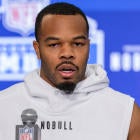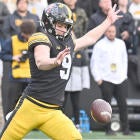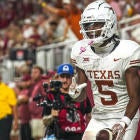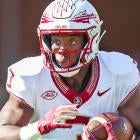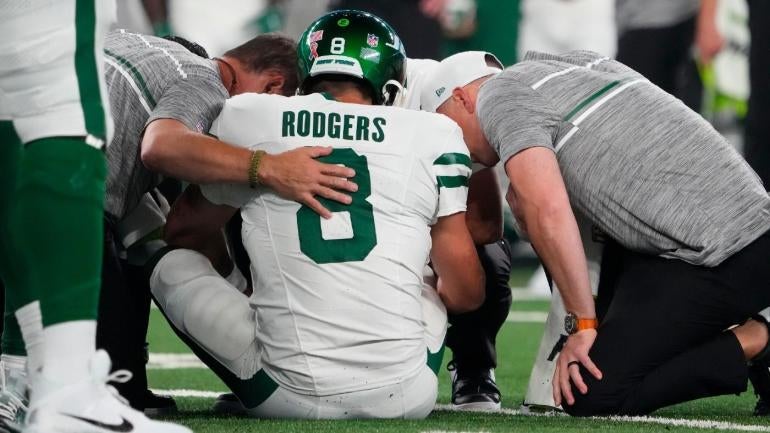
Aaron Rodgers had to play at least 65% of the offensive snaps for the New York Jets this season for the Green Bay Packers to get a 2024 first-round pick for him.
With Rodgers' season ending after four plays due to a torn Achilles, that condition will not be met, and the Packers will ultimately get a 2024 second-round pick to conclude the trade for the four-time NFL MVP.
But that wasn't the only condition in the language of the trade paperwork between the Jets and Packers, according to multiple sources who spoke to CBS Sports this week. Even though the Jets are guaranteed to send their second-round pick to the Packers, the Jets still do not have full control of their 2024 first-round pick because, technically, all of the conditions of the trade have not yet been met.
The NFL does not allow teams to deal picks not under their full control, so the Jets' first- and second-round picks will essentially be held in escrow for the entirety of the 2023 season. At the end of the year, Green Bay will get the Jets' second-rounder and Gang Green will officially own its first.
If the Jets wish to trade for a player who would require first-round compensation before the Oct. 31 deadline, they'll have to create terms that add a condition on top of a condition in order to satisfy the league.
According to a source, the Packers included particular language in the trade to protect themselves in case of any surprises. The language related to any potential transaction the Jets could do to circumvent Rodgers' salary or a Rodgers trade for any reason.
The language would protect the Packers and their trade compensation if the Jets tried to release and later sign Rodgers or if Rodgers forced a trade this year. And because either of those things could theoretically happen — even though there's virtually no chance of it taking place in reality — the trade conditions have not yet been completed and thus both picks are still in escrow.
The reasoning for this type of language likely leads back to one player, and it's an NFL plot twist that can only happen to the New York Jets: Brett Favre.
The Packers famously dealt Favre to the Jets in 2008 for a conditional fourth-round pick that wound up being a third-rounder. Favre, who spent a large chunk of the 2000s toying with retirement, played one season for the Jets before both sides parted ways. Favre retired and was placed on the reserve/retired list until the Jets officially released him from that in the spring of 2009.
By August, he had signed with the Vikings as their starting quarterback. This angered many in Green Bay for several reasons, not least of which was the fact the Packers attempted to protect themselves from the franchise great going to the rival team.
The Packers included a poison pill in the Favre-Jets trade paperwork that would have forced the Jets to relinquish three first-round picks if they wound up dealing Favre to any other NFC North team. The Packers had previously filed tampering charges with the league against Minnesota before his trade to New York, but the league ruled no violation occurred.
But the Jets had released Favre after one season, and no team could restrict his movement anywhere as a free agent at that point. So he signed with a team the Packers were suspicious of with no further compensation.
Poison pills were abolished in the 2011 collective bargaining agreement, but these Packers apparently still needed their own protection in case anything unusual happened with Rodgers.
But the Jets can still use the pick with some help. A team can agree to the aforementioned trade condition — holding a future first or some combination of picks until the 2024 first becomes free — or the Jets can go back to Green Bay and rework the language in the deal. Packers general manager Brian Gutekunst and the rest of the organization could agree to relieve the Jets of any conditional obligations now that Rodgers is done for the season and any unlikely transaction that could impact the Packers wouldn't take place.
All of this matters only until the NFL trade deadline at 4 p.m. ET on Oct. 31, and it really only matters if the Jets want to use a first-round pick on a player by then. For that price, the only player the Jets would target is a quarterback.
Jets head coach Robert Saleh has stated strongly the team now belongs to Zach Wilson, the 2021 No. 2 overall pick. Tim Boyle enters Week 2's matchup against the Cowboys as the sole backup, though the Jets will add a third quarterback as soon as next week.
But if things change for the Jets and they decide to be aggressive in the quarterback market for the second time in a calendar year, it won't be as simple as just sending over next year's top pick.
And they'll have Favre to thank — or blame — for that.


















